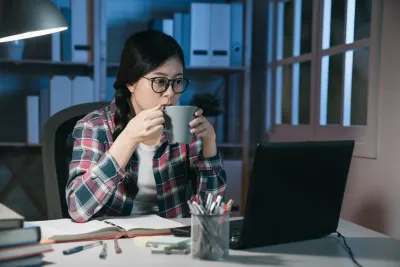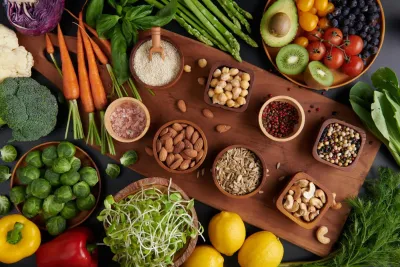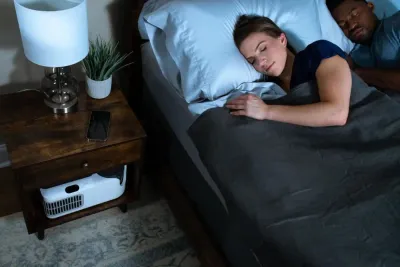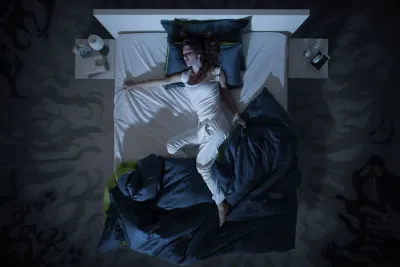Drinks That Can Keep You Awake
Ana Marie Schick: Resident Sleep Expert and Certified Health Coach • Nov 14, 2024

Key Takeaways
Certain drinks can interfere with sleep by stimulating the nervous system, disrupting sleep stages, or causing nighttime awakenings.
- Caffeinated drinks like coffee, iced tea, energy drinks, and some sodas can remain active in your system for hours, delaying sleep onset and reducing sleep depth.
- Alcohol may make you feel sleepy at first, but it disrupts REM sleep and increases nighttime wake ups, leading to less restorative rest.
- Sugary beverages can cause blood sugar spikes followed by crashes, which may trigger restlessness or middle of the night awakenings.
- Drinking large amounts of fluids close to bedtime increases the likelihood of waking up to use the bathroom, fragmenting sleep.
- Carbonated drinks can contribute to bloating and acid reflux, creating physical discomfort that makes falling asleep harder.
Given my love for morning coffee, I have realized that caffeine consumption, along with other beverages such as alcohol and even water, can subtly affect sleep. I’ve had to learn the hard way about how late in the day I can consume sweetened coffee drinks or other caffeinated beverages.
There have been instances where I’ve had a coffee at 4 p.m., only to feel exhausted before bedtime, yet I find myself struggling to fall asleep while staring at the ceiling.
Have you ever experienced this? If so, you’re not alone.
According to a recent survey, most people do not have a cutoff time for consuming coffee or caffeinated drinks. Additionally, the survey indicates that consuming 400 mg of caffeine before bedtime, whether it’s four to six hours prior, can significantly disturb your sleep quality. [1]
Below, I’m going to outline some of the top drinks that you should avoid before going to bed because they can disrupt your sleep.
Transform Your Sleep With Cooling Technology
Tired of tossing and turning due to uncomfortable bed temperatures? Our bed cooling system provides a personalized, temperature-controlled sleep environment. Say hello to better night's sleep!
Caffeine and Its Impact on Sleep
Let’s talk about caffeine and sleep. You already know it’s the stuff that gives your morning coffee that extra kick. However, do you know it can also disrupt some people’s sleep?
Caffeine stimulates the central nervous system, which is why you feel more awake and alert after drinking a cup of coffee, iced tea, or any drink that contains caffeine. This is great in the morning but not so much at night when you’re trying to wind down. Caffeine can also disrupt your sleep-wake cycle, making maintaining a consistent sleep pattern harder.
Even if you consume caffeine earlier in the day, its impact can persist. It may take several hours (four to six hours) for your body to metabolize caffeine. Typically, it takes about 1.5 to 9.5 hours for the body to eliminate half of the caffeine, with an average of around five hours. [2]
Various factors can influence this timeframe.
Did You Know: The FDA says caffeine can stay in your body for up to six hours. [3] This means that even after six hours of drinking coffee or tea, half of the caffeine you had is still there, making you stay awake.
If you’re struggling to fall asleep, consider tracking how much caffeine you consume. This may help you decide if you should cut back on your intake before bedtime, which could be beneficial. It’s not about giving up caffeine altogether, just keeping an eye on it.
Related Blog: Caffeine and Sleep. Can it disrupt the quality of your sleep?
Drinks to Avoid Before Sleep: Drinking Alcohol
You might think a nightcap will help you sleep, but alcohol intake is actually a double-edged sword. Sure, alcohol can make you feel sleepy at first, but as your body breaks it down, your sleep can get disrupted. It’s like hitting a snooze button every hour!
Alcohol can also prevent you from entering deep sleep. Deep sleep is crucial for feeling refreshed and well-rested. Alcohol can also disrupt your REM sleep, which is important for feeling refreshed and well-rested.
Plus, if you snore, have sleep apnea or other sleep disorders, alcohol can make it worse. So, while it might be tempting to have a drink late in the evening, it’s usually better to stick to non-alcoholic options.
Related Blog: How Does Alcohol Affect Sleep

Drinking Coffee
It’s a daily ritual for myself and many others—a comforting cup to start the day or a mid-afternoon pick-me-up. But while coffee is beloved for its ability to keep us stay awake and alert, it can also be a sneaky culprit when it comes to disrupting our sleep. You can thank the caffeine.
When you drink it, the caffeine doesn’t just disappear after you finish your cup. In fact, caffeine has a “half-life” of several hours. This means that if you drink one with 100 milligrams of caffeine at noon, around 50 milligrams will still be in your system at 6 p.m. For some, even this reduced amount of caffeine can still be enough to make falling asleep a challenge and potentially grow into sleep problems.
Research Study: Reports indicate that 70% of people drink coffee or some form of sweetened coffee drinks on a weekly basis, while 62% drink it daily. [4]
Because of this, it’s important to be mindful of when you have your last cup of coffee. Cutting off your consumption by early afternoon might be best if you’re trying to get a better night's sleep. This gives your body ample time to process most of the caffeine before heading to bed.
How Much Caffeine is in Your Coffee?
A regular cup contains about 95 milligrams of caffeine, though this can vary depending on the type of coffee bean and brewing method.
Even though decaffeinated coffee is often thought to be completely caffeine-free, it still contains about 2 to 5 milligrams of caffeine per cup. While this is significantly less than regular coffee, it’s not zero, and it can still have an effect, especially for those who are more sensitive to caffeine.
Sugary Drinks
Excess sugar in beverages can lead to a sudden surge in blood sugar levels, which can make you more alert and find it challenging to relax before bedtime.
However, after the sugar rush subsides, you may experience the unpleasant aftermath known as the sugar crash, leaving you feeling tired and irritable—a feeling I don’t enjoy!
While these sugary drinks are often seen as healthy, can be surprisingly acidic. This acidity can lead to heartburn, especially for people who are already prone to it. Plus, fruit juices can exacerbate reflux, making it difficult to sleep comfortably. If you’re struggling with heartburn or reflux, limit your intake of fruit juices, especially in the evening.
Did You Know: In the United States, energy drinks rank as the second most popular dietary supplement among young people, with approximately 30% regularly consuming them. [5]
It can also lead to bloating and fullness, as your stomach works overtime to digest it, making you feel sluggish and heavy. While enjoying fruit drinks and sports drinks occasionally is okay, moderation is key, especially in the evening.
Energy Drinks
They are popular for a quick boost of energy, but they can also disrupt your sleep. Here's why:
Caffeine Overload
These caffeinated beverages are packed with caffeine, which blocks chemicals that promote sleep in the brain, making it difficult to unwind and fall asleep, especially if consumed later in the day.
Additional Boosters
Ingredients such as taurine and guarana enhance alertness and may lead to jitters, making it even more challenging to drift off to sleep.
Sugar Rollercoaster
The high sugar content in energy drinks can cause fluctuations in blood sugar levels, causing restlessness and disrupted sleep.
Dehydration
Because caffeine is a diuretic, it can lead to frequent urination and potential dehydration, making it more difficult to sleep comfortably. Staying hydrated is important.
For better sleep, it's best to cut down on these drinks, especially in the evening, and choose calming, caffeine-free alternatives instead.

Soft Drinks and Sodas
Have you ever wondered why that can of soda seems to keep you up at night? Some can have a sneaky amount of caffeine. While a regular soda can have around 30 to 40 milligrams, energy drinks and certain flavored colas can pack even more caffeine, sometimes up to 55 milligrams per can.
Did You Know: Soda has a reputation for packing in empty calories, loads of sugar, refined carbs, and that infamous high fructose corn syrup. Learn more about the impact of high fructose corn syrup and sugar on your sleep.
All that extra caffeine can keep your brain whizzing and make it tough to relax, especially if you drink it later in the day. This can result in poor sleep.
Besides containing caffeine, sodas with high sugar levels can lead to sudden increases and drops in blood sugar, contributing to restlessness and disrupting sleep quality. If you want to improve your sleep, try to limit your soft drink consumption in the evening, and if you’re craving one, choose a caffeine-free alternative.
By limiting your soft drink consumption in the evening, you can achieve better quality sleep.
Enhanced Water and Infused Beverages
Enhanced water and infused beverages have become increasingly popular in recent years, with many claiming to offer various health benefits. However, some may contain ingredients that can interfere with your sleep quality.
Tip: If you're thirsty, just drink water.
First, be mindful of added caffeine. Some may contain caffeine. Always check the label to make sure the drink is caffeine-free if you’re consuming it in the evening.
Next, look at the sugar content. These beverages contain high amounts of sugar, which can lead to a rapid spike in blood sugar levels, followed by a crash. Look for drinks with little to no added sugar to avoid these fluctuations.
Plus, avoid drinks with stimulating ingredients. Certain ingredients like guarana, yerba mate, and ginseng can be stimulating and interfere with sleep. These components are often found in beverages marketed for energy and alertness, so avoiding them late in the evening is best.
Instead, look for drinks that contain calming ingredients like chamomile, lavender, or valerian root, which can promote relaxation and improve sleep quality. The goal is to limit poor sleep.
Green Tea
Often praised for its health benefits, green tea also contains caffeine. While generally lower than coffee (25-50 mg per 8-ounce cup), it's not caffeine-free. For those who are sensitive to caffeine, even this amount can lead to restlessness and difficulty falling asleep.
The L-theanine in green tea does offer a calming effect, creating "calm alertness," but it often doesn't fully counteract the stimulating effects of caffeine for everyone, especially when consumed too close to bedtime.
Timing: Drinking green tea right before bed can backfire. Caffeine takes about an hour to fully kick in, so that soothing cup might leave you staring at the ceiling instead of drifting off.
Start Sleeping Better Tonight
Improving sleep quality requires a combination of healthy habits, a consistent sleep schedule, and a sleep-conducive environment. If you're looking for ways to improve your sleep, make sure to read our blog, 13 Ways to Sleep Better at Night.
Did You Know: Approximately 63% of adults aged 18 and above across the nation reported consuming sugar-sweetened beverages at least once a day. These beverages include regular soda, sweetened fruit drinks, energy and sports drinks, as well as sweetened coffee/tea drinks. [6]
Calming Drinks to Help You Relax and Sleep Better
Certain drinks are known for their calming effects, helping you relax and improve sleep quality. From warm chamomile tea to magnesium-rich options, these beverages can support winding down before bedtime.
If you’re interested in learning about other drinks, check out our blog on Drinks That Help You Sleep for a deeper look at soothing options to enhance your nighttime routine.
Conclusion
It’s important to remember that what we drink, whether it's sports drinks or caffeinated drinks, can significantly impact the quality of our sleep. As you learned, some of our favorite and everyday beverages containing caffeine, including coffee, iced tea, soda, and energy drinks, can cause sleep disruptions, making it difficult to fall asleep and stay asleep.
Being mindful of what you drink, especially in the hours before bed, can significantly affect the quality of your sleep.
Instead of reaching for sugary drinks, including soda or a cup of coffee in the evening, consider opting for sleep-friendly alternatives like a glass of water, warm milk, or calming herbal teas such as chamomile or peppermint. These beverages can help you unwind and prepare for a restful night’s sleep.
Tip: Add some cut fruit or veggies to your cold tap or sparkling water for a crisp, refreshing drink.
By choosing wisely, you can enjoy a more peaceful night and wake up feeling refreshed and ready to take on the day.
Frequently Asked Questions about Drinks and Sleep
What Drinks Should Be Avoided Before Bed?
Coffee, energy drinks, alcohol, tea, and soft drinks can all disrupt sleep, so it's best to avoid or limit them before bedtime.
When Should You Not Drink Before Bed?
It's recommended that you should limit drinking two hours leading up to bedtime.
Peer-Reviewed Research References
-
American Academy of Sleep Medicine (AASM).
Late Afternoon and Early Evening Caffeine Can Disrupt Sleep at Night.
AASM, November 14, 2013.
Study Type: Professional Organization Research Summary
Key Finding: Caffeine consumed even six hours before bedtime can significantly reduce total sleep time and sleep quality by delaying sleep onset and fragmenting sleep stages.
View Resource
Source URL: https://aasm.org/late-afternoon-and-early-evening-caffeine-can-disrupt-sleep-at-night/
-
Institute of Medicine (US) Committee on Military Nutrition Research.
Caffeine for the Sustainment of Mental Task Performance: Formulations for Military Operations.
National Academies Press, 2001.
Study Type: Evidence-Based Consensus Report
Key Finding: Caffeine can temporarily enhance alertness and mental performance, but excessive or poorly timed intake increases the risk of sleep disruption and circadian misalignment.
View Study
Source URL: https://www.ncbi.nlm.nih.gov/books/NBK223808/
-
U.S. Food and Drug Administration (FDA).
Spilling the Beans: How Much Caffeine Is Too Much?
FDA, August 28, 2024.
Study Type: Government Consumer Health Guidance
Key Finding: For most healthy adults, up to 400 mg of caffeine per day is generally considered safe, though sensitivity varies and excessive intake can impair sleep, increase anxiety, and raise heart rate.
View Resource
Source URL: https://www.fda.gov/consumers/consumer-updates/spilling-beans-how-much-caffeine-too-much
-
National Coffee Association.
NCA Releases 2020 National Coffee Data Trends: The Atlas of American Coffee.
National Coffee Association, March 26, 2020.
Study Type: National Consumption Survey
Key Finding: Coffee remains one of the most widely consumed beverages in the U.S., with daily intake patterns that may influence sleep timing depending on caffeine consumption habits.
-
Alsunni, A. A.
Energy Drink Consumption: Beneficial and Adverse Health Effects.
International Journal of Health Sciences, 2015.
Study Type: Narrative Review
Key Finding: Energy drinks, which often contain high levels of caffeine and sugar, are associated with sleep disturbances, increased heart rate, and heightened anxiety, particularly when consumed later in the day.
View Study
Source URL: https://pmc.ncbi.nlm.nih.gov/articles/PMC4682602/
-
Centers for Disease Control and Prevention (CDC).
Get the Facts: Sugar-Sweetened Beverages and Consumption.
CDC, October 23, 2018.
Study Type: Government Public Health Resource
Key Finding: Frequent consumption of sugar-sweetened beverages contributes to excess calorie intake and metabolic health risks, which may indirectly affect sleep quality and energy regulation.









